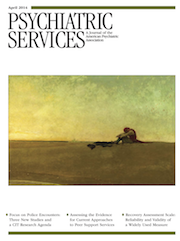In Reply: The two arguments raised by Dr. Geller play a central role in the ongoing national debate surrounding policy proposals to prevent persons with serious mental illness from having guns. Dr. Geller asserts that such policies—most of which have been proposed in response to mass shootings—are unlikely to prevent gun violence and likely to exacerbate public stigma toward persons with mental illness.
In the United States, an estimated 3%−5% of violence toward others is due to mental illness (
1). Policies to prevent persons with serious mental illness from having guns are therefore unlikely to prevent the majority of gun violence in our society. This does not mean, however, that preventing firearm violence committed by persons with mental illness is not a worthy policy goal. A robust body of research shows that during high-risk periods—such as the time surrounding inpatient hospitalization or a first episode of psychosis—small subgroups of persons with serious mental illness are at heightened risk of committing violence toward others (
2). Such violence is devastating to victims and perpetrators with mental illness alike, and recent research suggests that policies to prevent persons with serious mental illness from having guns can be effective. Under federal law, persons who have been involuntarily committed to inpatient psychiatric care or adjudicated mentally incompetent are prohibited from possessing firearms. Swanson and colleagues (
1) found that implementation of this law in Connecticut was associated with a significant reduction in risk of arrest for violent crime among persons prohibited from having a gun because of mental illness.
In addition, mental illness is strongly associated with risk of firearm suicide. Firearm suicide accounts for 60% of gun deaths in the United States, and most fatal suicide attempts involve guns (
1). Restricting access to lethal means is one of the only evidence-based strategies to prevent suicide (
3), and implementation of means-restriction interventions is one of the core goals of the 2012 National Strategy for Suicide Prevention. However, little research exists to inform implementation of means-restriction interventions to prevent firearm suicide. Keeping firearms from persons at serious risk of suicide will require a combination of persuasive counseling by clinicians and, when necessary, effective policies that allow for removal of firearms during periods of high risk. Research related to the development, implementation, and evaluation of such policies is critically needed.
Pervasive public stigma toward persons with serious mental illness in the United States is associated with poor health and social outcomes in this vulnerable population (
4). To date, however, no evidence exists to support the assertion that gun policies focused on mental illness exacerbate stigma. One national randomized study found that messages promoting policy to prevent “dangerous people” with serious mental illness from having guns did not heighten public stigma, compared with a control group (
5). However, little is known about how persons with mental illness view such policies. Future studies should assess mental health care consumers’ perspectives on existing or innovative policy mechanisms to prevent persons at risk of gun violence—particularly suicide—from having guns.

